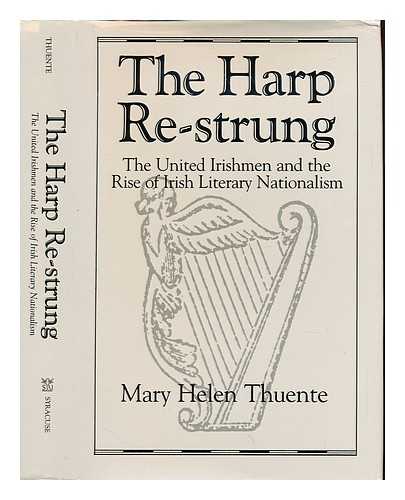
fine books - fair prices
| Search Antiqbook |
Ask a question or
Order this book
Browse our books
Search our books
Book dealer info

Author: THUENTE, MARY HELEN
Title: The harp re-strung : the United Irishmen and the rise of Irish literary nationalism
Description: Syracuse. N.Y. : Syracuse University Press 1994. First Edition. Fine cloth copy in an equally fine dust-wrapper. Particularly and surprisingly well-preserved; tight. bright. clean and especially sharp-cornered.Series; Irish studies (Syracuse. N.Y.). Physical description; x. 286 p. ; 24 cm. Notes; Includes bibliographical references (p. 257-270) and indexes. Summary; Most literary scholars believe that Irish literary nationalism originated in the 1840s with the Young Ireland movement. Mary Helen Thuente sets out to refute this claim and to demonstrate that Irish literary nationalism began instead with the United Irish movement of the 1790s. By re-evaluating the writings associated with the United Irish movement. their context within the culture. and their impact on subsequent Irish nationalistic writing. the author establishes that the movement played a pivotal role in the development of Irish literary nationalism. She provides balance in her treatment of elite and popular cultures. salvages information previously ignored by critics. and invites readers to look anew at the history and propaganda of the movement. The United Irishmen began as a club of parliamentary reformers in Belfast in 1791. Influenced by the French Revolution and related movements. these sons of the Enlightenment became ever more radical. Within five or six years. what had been a small club of intellectuals and political agitators resulted in a mass movement (largely composed of middle-class extremists) that was committed to overthrowing British rule in Ireland. This group published a substantial amount of verse and satire in their newspapers and produced four songbooks ('Paddy's Resource'). which represented an important stage in the evolution of Irish literary nationalism. Their literary endeavours synthesised multiple aspects of the 18th-century culture. including English literary tradition. Celticism and antiquarianism. political literature. music and popular culture. The pluralistic conception of Irish culture and society embodied in United Irish literary nationalism challenges the increasingly xenophobic and sectarian nationalism that developed in the course of the 19th century. The conventional view of this group overlooks their literary contributions and thus the full significance of their cause. Thuente seeks to recover both the writings associated with the United Irishmen and the cultural contexts to their movement to demonstrate that the literary contribution was as significant as their political effect. By making available to scholars an impressive array of little-known material. the author calls for a reassessment of the origins of Irish national literature. Subjects; United Irishmen - History. English literature - Irish authors - History and criticism. Nationalism in literature. Politics and literature - Ireland - History. Nationalism - Ireland - History. English literature. Dates covered: (1790-1800). Literary studies: 16th to 18th centuries ; Nationalism ; Cultural studies. English ; Ireland ; (c 1700 to c 1800). Literary Criticism / European / English. Irish. Scottish. Welsh. Genre; Bibliography. ISBN: 0815626169. Weight in Kg appr.:
Keywords: 0815626169
Title: The harp re-strung : the United Irishmen and the rise of Irish literary nationalism
Description: Syracuse. N.Y. : Syracuse University Press 1994. First Edition. Fine cloth copy in an equally fine dust-wrapper. Particularly and surprisingly well-preserved; tight. bright. clean and especially sharp-cornered.Series; Irish studies (Syracuse. N.Y.). Physical description; x. 286 p. ; 24 cm. Notes; Includes bibliographical references (p. 257-270) and indexes. Summary; Most literary scholars believe that Irish literary nationalism originated in the 1840s with the Young Ireland movement. Mary Helen Thuente sets out to refute this claim and to demonstrate that Irish literary nationalism began instead with the United Irish movement of the 1790s. By re-evaluating the writings associated with the United Irish movement. their context within the culture. and their impact on subsequent Irish nationalistic writing. the author establishes that the movement played a pivotal role in the development of Irish literary nationalism. She provides balance in her treatment of elite and popular cultures. salvages information previously ignored by critics. and invites readers to look anew at the history and propaganda of the movement. The United Irishmen began as a club of parliamentary reformers in Belfast in 1791. Influenced by the French Revolution and related movements. these sons of the Enlightenment became ever more radical. Within five or six years. what had been a small club of intellectuals and political agitators resulted in a mass movement (largely composed of middle-class extremists) that was committed to overthrowing British rule in Ireland. This group published a substantial amount of verse and satire in their newspapers and produced four songbooks ('Paddy's Resource'). which represented an important stage in the evolution of Irish literary nationalism. Their literary endeavours synthesised multiple aspects of the 18th-century culture. including English literary tradition. Celticism and antiquarianism. political literature. music and popular culture. The pluralistic conception of Irish culture and society embodied in United Irish literary nationalism challenges the increasingly xenophobic and sectarian nationalism that developed in the course of the 19th century. The conventional view of this group overlooks their literary contributions and thus the full significance of their cause. Thuente seeks to recover both the writings associated with the United Irishmen and the cultural contexts to their movement to demonstrate that the literary contribution was as significant as their political effect. By making available to scholars an impressive array of little-known material. the author calls for a reassessment of the origins of Irish national literature. Subjects; United Irishmen - History. English literature - Irish authors - History and criticism. Nationalism in literature. Politics and literature - Ireland - History. Nationalism - Ireland - History. English literature. Dates covered: (1790-1800). Literary studies: 16th to 18th centuries ; Nationalism ; Cultural studies. English ; Ireland ; (c 1700 to c 1800). Literary Criticism / European / English. Irish. Scottish. Welsh. Genre; Bibliography. ISBN: 0815626169. Weight in Kg appr.:
Keywords: 0815626169
Price: EUR 60.00 = appr. US$ 65.21 Seller: MW Books
- Book number: 232857
- Book number: 232857